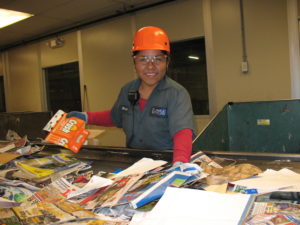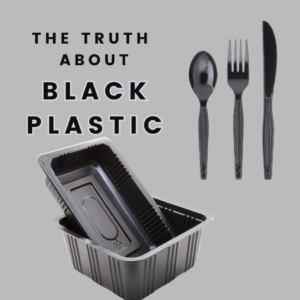Join us on Wednesday, July 3st, at 2pm CT for the film screening and discussion.
Reduce, reuse, then recycle: this was the original hierarchy proposed to keep natural resources in the ground and curb the worst impacts of our consumption. Instead, the petrochemical and packaging industries have exploited this premise and used recycling as a cover to increase plastic production exponentially. The truth is: the onus for solving our plastic pollution crisis isn’t on recyclers; it’s on plastic producers. They are simply making too much plastic, most of which cannot be recycled.
In recognition of Plastic Free July, we are joining the Alliance for Mission Based Recycling (AMBR) and Ocean Conservancy for a discussion on authentic solutions to plastic pollution. The event will include a screening of “Chasing Arrows: The Truth About Recycling,” a short film produced by AMBR in partnership with the Emmy Award-winning Peak Plastic Foundation. The film outlines how the plastics industry is trashing recycling with non-recyclable plastics and exposes the recycling myths the industry promotes, such as blaming the recycling system and consumers for plastic pollution.
Hear from Ocean Conservancy and AMBR as they delve into the current zero waste landscape and share valuable insights from their communities. A live Q&A session will follow the panel discussion.
Meet the Panelists:
Dr. Anja Brandon, Associate Director of U.S. Plastic Policy for Ocean Conservancy, has helped draft landmark state and national legislation regulating plastics, including as part of the team of advocates that helped pass the strongest plastics legislation in the country, SB 54 in California. Prior to joining Ocean Conservancy, Anja was the AGU/AAAS Congressional Science Fellow in the office of U.S. Senator Jeff Merkley (D-OR), where she was the lead policy advisor on issues including plastics, water pollution, and toxics. Anja holds a Ph.D. in Environmental Engineering from Stanford University where she was awarded an NSF Graduate Research Fellowship for her research on plastic waste management challenges and novel methods to break down common plastics.
Katie Drews is Co-President and CEO of Eureka Recycling and National Director for AMBR. In her roles, Katie provides comprehensive executive leadership across organizational strategy, finance, communications, client contracts and services, Zero Waste policy, and community engagement and education. With a strong foundation in marketing and business strategy, she has demonstrated a keen ability to drive impactful change and innovation.
Martin Bourque, Executive Director of the Ecology Center (Berkeley), is a renowned environmental expert who has led the Berkeley Ecology Center since 2000. By linking local grassroots grit with highly competent program implementation, Martin is helping AMBR become a high-impact engine of change. Under Martin’s leadership, the Ecology Center operates the nation’s first and longest-running curbside recycling program and pioneers Zero Waste policy solutions at the local level that have national and international implications. Martin has spearheaded innovative efforts such as the Berkeley Food Policy Council, the Berkeley Climate Action Coalition, California Alliance of Farmers’ Markets, Market Match (electronic food stamp access and incentives at farmers’ markets), and the nation’s first Soda Tax.
Lucy Mullany, Director of Policy & Advocacy for Eureka Recycling and AMBR, will moderate the discussion. In her role at Eureka, Lucy leads local, state, and federal policy advocacy and serves as the National Director of Policy for AMBR. Her work at Eureka has included helping to launch the Minnesota Zero Waste Coalition and leading efforts to pass Extended Producer Responsibility for Packaging legislation in Minnesota. Before coming to Eureka, Lucy was a leading advocate for economic justice and financial security policy at the federal, state, and local levels. During her tenure, Lucy passed significant legislation, including the passage of the country’s first automatic retirement savings program for low-wage workers, reforms to the Temporary Assistance to Needy Families program, and consumer protections against predatory financial loans and products.

Tour Eureka Recycling’s Upgraded Facility on May 31!
Ever wondered what happens to your recyclables after they leave your curb? Join us at Eureka Recycling’s Community Tour Day

Eureka Recycling Celebrates 20 Years and Facility Upgrade
This Earth Day, we are proud to celebrate two major milestones:two decades of pioneering mission-driven materials processing and the launch

Ditching Black Plastic
Black plastics are bad news. They’re toxic, and they’re not recyclable. So why are we still using them for
